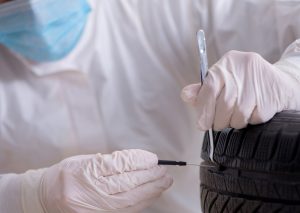 Accident reconstruction evidence was the subject of a recent appellate case in Ohio. Everyone has heard of accident reconstruction, but most people do not know much about it. This raises the question of whether accident reconstruction evidence involves ‘expert testimony’. That question was answered by the Ohio appellate court in State v. Davis. That case illustrates the significance of the ‘expert testimony’ label and contains important lessons for Ohio attorneys who handle cases of OVI, Vehicular Assault, and Vehicular Homicide.
Accident reconstruction evidence was the subject of a recent appellate case in Ohio. Everyone has heard of accident reconstruction, but most people do not know much about it. This raises the question of whether accident reconstruction evidence involves ‘expert testimony’. That question was answered by the Ohio appellate court in State v. Davis. That case illustrates the significance of the ‘expert testimony’ label and contains important lessons for Ohio attorneys who handle cases of OVI, Vehicular Assault, and Vehicular Homicide.
What is Accident Reconstruction?
Accident reconstruction is conducted after an accident investigation. Accident investigation is the collection of evidence at the accident scene. An accident investigator preserves physical evidence ad takes measurements, photographs, videos and witness statements. An accident investigator also reports the conditions of the road, lighting, vehicles, and vehicle occupants. The accident investigator is typically a police officer.
Accident reconstruction is a scientific evaluation of the collected evidence to conclude how the crash occurred and determine the cause of the crash. An accident reconstructionist determines points of first possible perception, actual perception, no escape, operator action, impact, and final resting position. A reconstructionist also analyzes data from vehicle control modules, global positioning systems, vehicle cameras, and ‘black box’ reports from electronic data recorders. A reconstructionist often uses computer-assisted formulas and computer generated simulations to arrive at conclusions. The accident reconstructionist may be a police officer or a civilian and should be certified in accident reconstruction.
Does Accident Reconstruction Evidence Involve Expert Testimony?
According to Rule 702 of the Ohio Rules of Evidence, expert testimony, “either relates to matters beyond the knowledge or experience possessed by lay persons or dispels a misconception common among lay persons.” Although lay persons may have some knowledge of accident reconstruction (from movies, television, and the internet), an accident reconstructionist provides information “beyond the ken” of an ordinary person. Therefore, accident reconstruction evidence is expert testimony.
Why Does the ‘Expert Testimony’ Label Matter?
The ‘expert testimony’ label is important for two reasons. First, for a witness to provide expert testimony, Rule 16 of the Ohio Rules of Criminal Procedure requires the expert to prepare a written report summarizing the expert’s testimony and qualifications. The expert’s report must be disclosed to the opposing party at least 21 days prior to trial.
Second, for a witness to provide expert testimony, Rule 702 requires that the witness be qualified by specialized knowledge, skill, experience, training, or education. In addition, the witness’ testimony must based on reliable scientific, technical, or other specialized information. If the expert performed testing, the test must be based on a scientific theory and implement that theory in way that yields an accurate result.
What Happened in the Ohio Case?
In the case of State v. Davis, an officer testified about the accident reconstruction he performed but did not provide an expert witness report in advance. The defense attorney brought this to the attention of the judge but did not make a formal objection. Davis was convicted and appealed to the court of appeals.
The appellate court observed the officer had training in accident reconstruction and over 500 hours of experience. Based on that, the officer testified about conclusions he drew from the evidence and gave an opinion about the cause of the accident. The Court concluded the officer provided expert testimony without providing a written report, so the officer’s testimony should have been excluded. The Court also held the defense attorney provided ineffective assistance of counsel by failing to object to the expert testimony.
What is the Lesson for Ohio Attorneys?
The Davis case contains important reminders for Ohio attorneys who represent clients for charges of OVI with an accident, Vehicular Homicide, and Vehicular Assault. First, when expert testimony violates Ohio rules, defense attorneys must object. Second, when accident reconstruction evidence is properly admitted, defense attorneys must understand how to combat that evidence at trial.
About the Author: Shawn Dominy is a leading DUI lawyer in Ohio and the founder of the Dominy Law Firm in Columbus, Ohio. He can be reached through his law firm’s website: Dominy Law Firm.